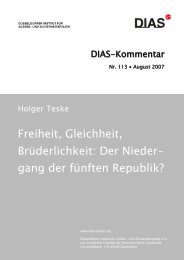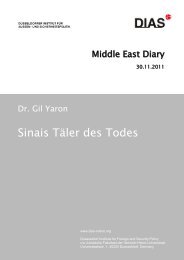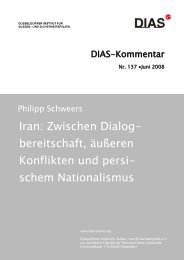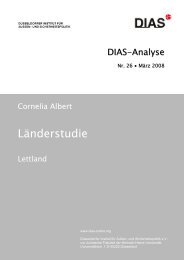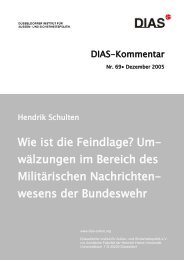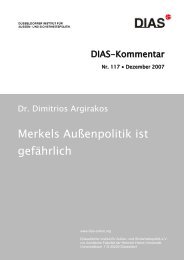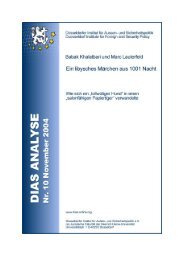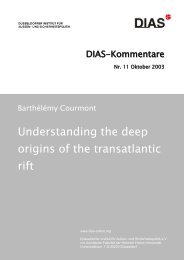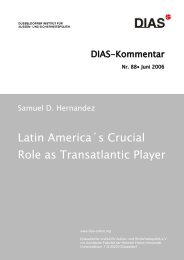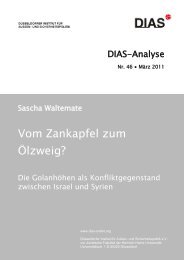NATO Collective Security or Defense - DIAS - Düsseldorfer Institut ...
NATO Collective Security or Defense - DIAS - Düsseldorfer Institut ...
NATO Collective Security or Defense - DIAS - Düsseldorfer Institut ...
Create successful ePaper yourself
Turn your PDF publications into a flip-book with our unique Google optimized e-Paper software.
Joshua Stern: <strong>NATO</strong> <strong>Collective</strong> <strong>Security</strong> <strong>or</strong> <strong>Defense</strong>: The Future of <strong>NATO</strong> in Light of Expansion and 9/11<br />
seen as a small price to pay f<strong>or</strong> <strong>NATO</strong> action, success, and legitimacy. But after 9/11, the role<br />
of <strong>NATO</strong> and the threat to the w<strong>or</strong>ld has changed. Suddenly the US was directly attacked, and<br />
be-lieved there was now a real threat to its self interest. Under this condition, some believe<br />
(includ-ing the US) the collective security doctrine can hamper a country from acting against<br />
such a threat. A good example is the recent events in Afghanistan, when the US did not ask<br />
f<strong>or</strong> <strong>NATO</strong> assistance, even though <strong>NATO</strong> invoked Article 5 of the N<strong>or</strong>th Atlantic Treaty.<br />
Making it appar-ent, when it came to a real imminent threat the US has no need f<strong>or</strong> <strong>NATO</strong>,<br />
because of its collec-tive security nature.<br />
<strong>NATO</strong> Expansion<br />
From its conception, <strong>NATO</strong> has always left the do<strong>or</strong> to expansion open. Article 10 in the<br />
N<strong>or</strong>th Atlantic treaty states “The parties may, by unanimous agreement, invite any other European<br />
state in a position to further the principals of this Treaty and to contribute to the security<br />
of the N<strong>or</strong>th Atlantic area to accede to this Treaty”. Nevertheless, after the Cold War expansion<br />
became a maj<strong>or</strong> issue in the debate over <strong>NATO</strong> transf<strong>or</strong>mation. Those in fav<strong>or</strong><br />
wanted <strong>NATO</strong> to encom-pass the old members of the Soviet block in Europe as a way to stabilize<br />
<strong>NATO</strong>‟s b<strong>or</strong>ders, help these ex-communist countries make the transition to stable democratic<br />
market economies, and increase <strong>NATO</strong>‟s legitimacy in the region. As f<strong>or</strong> the potential<br />
members, joining <strong>NATO</strong> became a way to guarantee their independence f<strong>or</strong> the f<strong>or</strong>eseeable<br />
future against any kind of reemerging Russian power, and became a signal of a country‟s acceptance<br />
into the Western W<strong>or</strong>ld. On the other hand, detract<strong>or</strong>s believed many of these countries<br />
were not ready to join the alliance, and instead of stabilizing the region, would only<br />
frightened the Russians who might view expansion as encirclement . M<strong>or</strong>eover, new members<br />
meant it would be harder f<strong>or</strong> <strong>NATO</strong> to act as a col-lective security alliance, because the new<br />
members would add very little capability to the alliance and only threaten to broaden the alliance‟s<br />
interests and security problems.<br />
F<strong>or</strong> most of the 1990‟s <strong>NATO</strong> hesitated to move in either direction. If <strong>NATO</strong> expanded too<br />
fast it could cause ref<strong>or</strong>m to wane in f<strong>or</strong>mer communist countries, and create feelings of mistrust<br />
with Russia. But if <strong>NATO</strong> moved to slow it risked creating the image it was not ready to<br />
ac-cept these countries into the West. In response, <strong>NATO</strong> established the Partnership f<strong>or</strong><br />
Peace Program. The program allowed all f<strong>or</strong>mer communist states to join and take part in alliance<br />
meetings and missions, hoping this would placate the fears that <strong>NATO</strong> would not f<strong>or</strong>get<br />
about the ex-communist countries, and ease tension with Russia . <strong>NATO</strong>‟s solution was to<br />
release a study in September of 1995 laying out the reasons and criteria f<strong>or</strong> <strong>NATO</strong> expansion.<br />
A few of these criteria were:<br />
� Encouraging and supp<strong>or</strong>ting democratic ref<strong>or</strong>ms, including civilian and democ-ratic control<br />
over the military;<br />
� Promoting good-neighb<strong>or</strong>ly relations, which would benefit all countries in Euro-Atlantic<br />
area, both members and non-members of <strong>NATO</strong>;<br />
� Reinf<strong>or</strong>cing the tendency towards integration and cooperation in Europe based on shared<br />
democratic values and thereby curbing the countervailing tendency to-ward disintegration<br />
along ethnic and territ<strong>or</strong>ial lines;<br />
� Strengthening the alliance’s ability to contribute to European and international se-curity,<br />
including participation in peacekeeping activities under the responsibility of the OSCE<br />
and peacekeeping operations under the auth<strong>or</strong>ity of the UN <strong>Security</strong> Council as well as<br />
there new missions.



